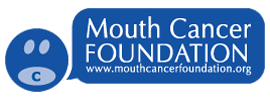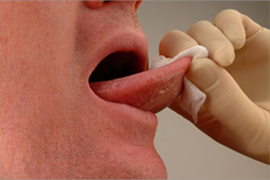
Studies show that mouth cancer is on the increase and that early detection dramatically improves the chances of recovery. Late detection of mouth cancers has resulted in a higher proportion of deaths per number of cases than breast cancer, cervical cancer or skin melanoma, with about 2,700 deaths per year in the UK.


Mouth cancer screening is a simple procedure performed at a dental practice that involves the following:
It is recommended that you come in for a screening on a yearly basis. If you have any sores, lumps or long-term ulcers in your mouth, no matter how small, it is very important that you come in to have it looked at. Because smoking is strongly linked with many forms of cancer and other dental problems, we always encourage our patients to quit smoking. An excellent source of information is the Mouth Cancer Foundation if you require any further information.
Mouth cancer screening is a process of examining your mouth, lips, and throat to look for any signs of oral cancer. It helps in the early detection of mouth cancer, which increases the chances of successful treatment.
Mouth cancer, if not detected and treated early, can be life-threatening. Regular screenings can help identify any potential issues early on, increasing the chances of successful treatment. Early detection also allows for less invasive treatment options and better chances of recovery.
Everyone should consider getting a mouth cancer screening, especially if they have certain risk factors such as tobacco or alcohol use, a history of oral cancer, or a family history of cancer. Regular screenings are especially crucial for individuals aged 40 and above.
The frequency of mouth cancer screenings can vary depending on your risk factors and overall health. Your dentist will be able to assess your individual situation and recommend an appropriate screening schedule. In general, it is advisable to have a screening at least once a year.
During a mouth cancer screening, your dentist will visually examine your mouth, lips, tongue, and throat for any abnormalities. They may also carefully feel your jaw and neck to check for any lumps or swelling. In some cases, additional tests such as a biopsy or imaging scans may be recommended.
No, mouth cancer screening is usually not painful. It is a non-invasive procedure that involves visual examination and feeling for any abnormalities. However, if any suspicious areas are identified during the screening, further tests or procedures may be necessary, which might cause some discomfort.
Early signs and symptoms of mouth cancer may include persistent mouth sores, red or white patches in the mouth, unexplained bleeding, difficulty swallowing or speaking, a lump or thickening in the mouth or neck, and persistent earaches. It is important to note that these symptoms can also be related to other conditions, so it is best to consult a dentist for an accurate diagnosis.
Mouth cancer can be cured, especially if detected early. Treatment options for mouth cancer may include surgery, radiation therapy, chemotherapy, or a combination of these. The prognosis and chances of successful treatment depend on various factors such as the stage of cancer, the individual’s overall health, and the timeliness of treatment.
While there is no guaranteed way to prevent mouth cancer, there are certain lifestyle choices that can significantly reduce the risk. These include avoiding tobacco and alcohol use, practising good oral hygiene, eating a balanced diet rich in fruits and vegetables, and protecting your lips from excessive sun exposure.
Dentists play a crucial role in mouth cancer screening. They are trained to identify any suspicious signs or symptoms and can refer you to a specialist for further evaluation and treatment if needed. Regular dental check-ups often include thorough examinations of the mouth, making them an ideal opportunity for screening.
Many dental insurance plans cover regular screenings for mouth cancer. However, it is always recommended to check with your insurance provider to understand the specific coverage details. If you do not have dental insurance, your dentist may be able to provide information on affordable options or assist you in finding financial assistance programmes.
While self-examinations can help identify any changes in your mouth, they are not a substitute for professional mouth cancer screenings. Dentists are trained to recognise subtle signs and symptoms that might not be apparent to an untrained eye. Regular dental check-ups should always include a proper mouth cancer screening conducted by a professional.

